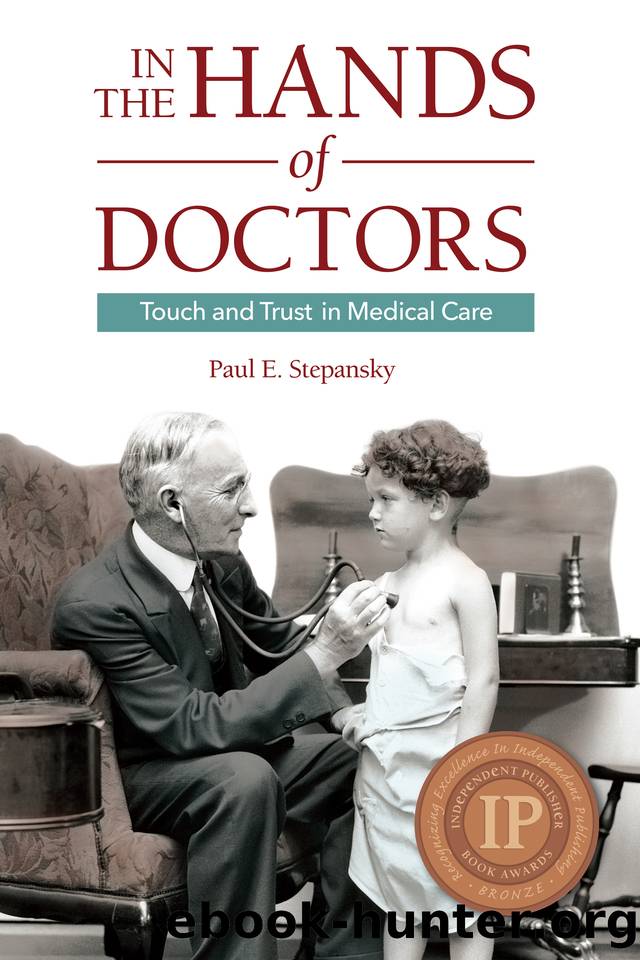In the Hands of Doctors: Touch and Trust in Medical Care by Stepansky Paul

Author:Stepansky, Paul [Stepansky, Paul]
Language: eng
Format: epub
Publisher: Keynote Books, LLC
Published: 2017-11-30T00:00:00+00:00
Chapter 9
General Practice and Its Discontents
Take from scientific medicine the contributions made to it by the country doctor and you rob it of half its glory.
âVictor C. Vaughan, A Doctor's Memories (1926)
P ity the American general practitioner, whose imminent disappearance has been forecast since the late nineteenth century. Here is Andrew Smith writing about "The Family Physician" in Harper's in 1888:
It will readily be seen that amid all these claimants for pathological territory there is scarcely standing-room left for the general practitioner.(1)
And here is Abraham Jacobi, the founder of modern pediatrics, in 1910:
The time when every family, rich or poor, had its own family physician, who knew the illnesses and health of its members and enjoyed the confidence of the upgrowing boys and girls during two or three generations, is gone.(2)
Here is A. F. van Bibber, a small-town practitioner and popular writer from Maryland, in "The Swan Song of the Country Doctor" of 1929:
More recent investigation shows that almost one-third of the towns of 1,000 or less throughout the United States which had physicians in 1914 had none in 1925... it will be seen at a glance that the present generation of country doctors will have practically disappeared in another ten years.(3)
For the pulmonologist and TB specialist Paul Dufault, who celebrated the glories of American medicine at midcentury, the general practitioner was little more than a relic, albeit an admirable relic about whom one might rhapsodize:
Those who have reached middle age still remember the general practitioner, now almost extinct in some localities. Closely resembling modern internists, they were a grand old type, freelancing in abscesses and phlegmons, shuttling between mother and baby, turning a hand at small repairs, amputating a finger, sewing a cut, making little incursions into allergic territory, encouraging the depressed wife, upbraiding the exuberant husband, looking into a roguish eye, peering into a deaf ear, holding down a rebellious stomach or extinguishing a fiery rash as the occasion arose. They knew much about many things and did much for many people. May fate be kind to those who remain!(4)
Far more glum was David Rutstein, head of Harvard Medical School's department of preventive medicine, in 1960:
But complete medical care means more than the sum of the services provided by specialists, no matter how highly qualified. It must include acceptance by one doctor of complete responsibility for the care of the patient and for the coordination of specialist, laboratory, and other services. Within a generation, if the present situation continues, few Americans will have a personal physician do this for them.(5)
And finally, in our own time, here is the primary care educator Thomas Bodenheimer, speaking not only of family physicians (FPs) but of the entire category of "primary care physicians" (PCPs) that includes family physicians, general internists, and general pediatricians:
Whoever takes up the cause of primary care, one thing is clear: action is needed to calm the brewing storm before the levees break.(6)
In Great Britain, the provenance of such jeremiads is older still. In Scotland, Dr. John Brown, equally
Download
This site does not store any files on its server. We only index and link to content provided by other sites. Please contact the content providers to delete copyright contents if any and email us, we'll remove relevant links or contents immediately.
Periodization Training for Sports by Tudor Bompa(8276)
Why We Sleep: Unlocking the Power of Sleep and Dreams by Matthew Walker(6728)
Paper Towns by Green John(5194)
The Immortal Life of Henrietta Lacks by Rebecca Skloot(4592)
The Sports Rules Book by Human Kinetics(4393)
Dynamic Alignment Through Imagery by Eric Franklin(4218)
ACSM's Complete Guide to Fitness & Health by ACSM(4060)
Kaplan MCAT Organic Chemistry Review: Created for MCAT 2015 (Kaplan Test Prep) by Kaplan(4014)
Introduction to Kinesiology by Shirl J. Hoffman(3776)
Livewired by David Eagleman(3776)
The Death of the Heart by Elizabeth Bowen(3625)
The River of Consciousness by Oliver Sacks(3606)
Alchemy and Alchemists by C. J. S. Thompson(3524)
Bad Pharma by Ben Goldacre(3428)
Descartes' Error by Antonio Damasio(3280)
The Emperor of All Maladies: A Biography of Cancer by Siddhartha Mukherjee(3164)
The Gene: An Intimate History by Siddhartha Mukherjee(3099)
The Fate of Rome: Climate, Disease, and the End of an Empire (The Princeton History of the Ancient World) by Kyle Harper(3067)
Kaplan MCAT Behavioral Sciences Review: Created for MCAT 2015 (Kaplan Test Prep) by Kaplan(2987)
